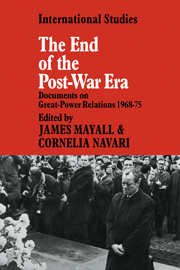Book contents
- Frontmatter
- Contents
- Preface
- Source Abbreviations
- Note on the texts of the documents
- Introduction
- I THE END OF THE COLD WAR
- II THE DIPLOMACY OF DETENTE
- A Relations between the United States and the Soviet Union
- B Independent initiatives of the Western Powers
- C Negotiations on Security in Europe
- III CHANGES IN THE WESTERN ALLIANCE
- IV THE WARSAW TREATY ORGANISATION
- V THE GREAT POWERS AND THE MIDDLE EAST WAR OF OCTOBER 1973
- VI THE CRISIS OF THE INTERNATIONAL ECONOMIC ORDER
C - Negotiations on Security in Europe
Published online by Cambridge University Press: 07 October 2011
- Frontmatter
- Contents
- Preface
- Source Abbreviations
- Note on the texts of the documents
- Introduction
- I THE END OF THE COLD WAR
- II THE DIPLOMACY OF DETENTE
- A Relations between the United States and the Soviet Union
- B Independent initiatives of the Western Powers
- C Negotiations on Security in Europe
- III CHANGES IN THE WESTERN ALLIANCE
- IV THE WARSAW TREATY ORGANISATION
- V THE GREAT POWERS AND THE MIDDLE EAST WAR OF OCTOBER 1973
- VI THE CRISIS OF THE INTERNATIONAL ECONOMIC ORDER
Summary
Declaration of the NATO Council on Mutual and Balanced Force Reductions, Reykjavik, 25 June 1968
Declaration Adopted by Foreign Ministers and Representatives of Countries Participating in the NATO Defence Programme.
1. Meeting at Reykjavik on 24 and 25 June 1968, the Ministers recalled the frequently expressed and strong desire of their countries to make progress in the field of disarmament and arms control.
2. Ministers recognised that the unresolved issues which still divide the European Continent must be settled by peaceful means, and are convinced that the ultimate goal of a lasting, peaceful order in Europe requires an atmosphere of trust and confidence and can only be reached by a step-by-step process. Mindful of the obvious and considerable interest of all European states in this goal, Ministers expressed their belief that measures in this field including balanced and mutual force reductions can contribute significantly to the lessening of tension and to further reducing the danger of war.
3. Ministers noted the important work undertaken within the North Atlantic Council by member governments in examining possible proposals for such reductions pursuant to Paragraph 13 of the ‘Report on the Future Tasks of the Alliance’, approved by the Ministers in December 1967. In particular, they have taken note of the work being done in the committee of Political Advisers to establish bases of comparison and to analyze alternative ways of achieving a balanced reduction of forces, particularly in the central part of Europe.
- Type
- Chapter
- Information
- The End of the Post-War EraDocuments on Great-Power Relations 1968-1975, pp. 255 - 344Publisher: Cambridge University PressPrint publication year: 1980



